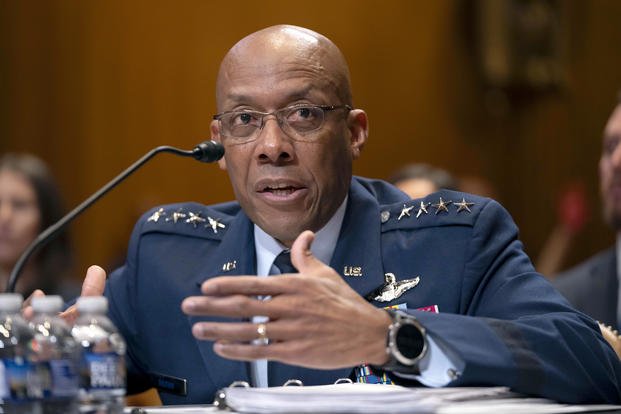Joint Chiefs Nominee's Ties to Trump Family Raise Concern About Ethics, Influence

President Donald Trump's choice last week to nominate Lt. Gen. Dan "Razin" Caine as his pick to be chairman of the Joint Chiefs of Staff marks uncharted territory for the military.
Caine, a retired three-star Air Force[1] general, does not meet the legal requirements to serve as the nation's top military officer because, unlike his predecessor Gen. Charles "CQ" Brown, he never served as the vice chairman of the Joint Chiefs of Staff, the head of a service branch, or the commander of a unified or specified combatant command.
A waiver will need to be granted for Caine to serve in the position, but other issues also loom. The military general's relationship to Trump and business ties to his family are raising concerns about his appointment, ethics experts told Military.com, and former classmates of the officer fear the precarious position their colleague may be put in by the president.
Read Next: Air Force Academy Investigating Nearly 100 Cadets for Cheating, Honor Code Violations[2]
Caine's nomination comes after the controversial firing of Brown and other top service officials[3] this month, prompting five former defense secretaries including Lloyd Austin and Jim Mattis to issue a letter this week[4] urgently calling for congressional hearings into the matter -- and a hold on Caine's nomination until it happens.
"The House and Senate should demand that the administration justify each firing and fully explain why it violated Congress' legislative intent that the chairman of the Joint Chiefs of Staff complete a four-year term in office. General CQ Brown Jr. had not yet completed two years in the job," the former top civilian Pentagon leaders wrote. "In the meantime, senators should refuse to confirm any new Defense Department nominations, including that of retired Lt. Gen. Dan Caine as the next chairman of the Joint Chiefs of Staff."
Military.com reached out to Caine for comment on Friday but did not receive an immediate response.
Caine would be the first career Air National Guard[5] officer to be chair of the Joint Chiefs of Staff, according to the National Guard Association of the United States, a nonprofit organization that lobbies on behalf of the reserve component.
If granted a waiver and confirmed, Caine would also be the third Guardsman to take over the highest ranks of the new administration. Defense Secretary Pete Hegseth was an Army[6] National Guard major, and Michael Waltz, a former congressman and retired Army Guard Special Forces[7] colonel, is serving as Trump's national security adviser.
"We look forward to working with another senior Pentagon official who understands the lethality and efficiency the Guard brings to the fight," Retired Maj. Gen. Francis McGinn, the NGAUS president, said in a statement. "Our community is ready and willing to play a critical role in implementing peace through strength and supporting the strategy of denial."
Caine started as an F-16 Fighting Falcon[8] pilot at Syracuse Air National Guard Base, New York, according to a copy of his service biography, and had numerous Guard assignments throughout his three-decade career. His most recent assignment was as the associate director for military affairs at the CIA.
But between 2018 and 2019, he also served as the deputy commanding general of the U.S. Central Command Special Operations Component and the Special Operations Joint Task Force for Operation Inherent Resolve, the military's fight against the Islamic State terrorist group -- an assignment which Trump has publicly praised multiple times in speeches
"I look forward to working with him, and he will give straightforward advice, as he did to President Trump on the defeat of ISIS," Hegseth said in a recent interview on Fox News, adding "the president respects leaders who untie the hands of warfighters in a very dangerous world. I think Dan Caine's the man to meet the moment."
Ties to the Kushners
Aside from being an unusual pick for his resume -- his military experience does not meet the criteria for the chairman post as laid out by the law -- Caine is also retired.
Caine, who is described in his official Air Force biography[9] as "a serial entrepreneur and investor," immediately joined the boards of several companies and investment firms when he retired that may lead to conflicts for him as he reenters the military.
According to his LinkedIn profile[10], starting in January 2025, Caine became a member of several venture capital firms including Voyager Space, Shield Capital and Thrive Capital.
According to their websites, both Voyager[11] and Shield are focused[12] on space and national security technologies -- huge fields of growth for the military.
Meanwhile, Thrive Capital is an investment firm that is run by Joshua Kushner, the younger brother of Jared Kushner, Trump's son-in-law and onetime adviser.
While Jared does not appear to be involved in the second Trump administration, the pair's father, Charles Kushner, has been nominated to serve as ambassador to France after making one of the largest donations to the Trump political action committee "Make America Great Again Inc." in 2023.
Concerns over industry ties are not new. They have been a staple of[13] discussion for[14] the Pentagon's civilian leaders[15] -- namely defense secretaries -- going back[16] many administrations.
Spokespeople for the Joint Chiefs declined to comment on Caine's ties to the Kushner family, directing comment to the defense secretary's office and the White House. Neither responded by publication time.
Craig Holman, a government affairs lobbyist with Public Citizen, a nonprofit watchdog advocacy organization, told Military.com that "there has always been a problem, particularly with the military and military contracts -- retired generals moving into positions on boards of companies that are then securing military contracts."
Caine's appointment, however, will now bring those concerns into the military ranks.
"The extent of that type of conflict of interest this time around is unprecedented," Holman told Military.com. "We've never seen it go this far."
"All of this is very, very troubling, both in terms of the actual conflicts of interest and the lack of capability of many of these appointees, not just in the military, by the way, but throughout, throughout the executive branch," he said.
'Brother Rats'
Caine began his military career after graduating in 1990 from the Virginia Military Institute, or VMI, one of the nation's public senior military colleges. The day after Trump announced him as Brown's replacement, Caine's alma mater issued a news release congratulating the retired officer on his nomination.
Fellow graduates of the Virginia Military Institute told Military.com that they had great admiration for Caine, but feared the circumstances in which he's been nominated to serve as the president's top military adviser.
The southern military college is a close-knit group. As freshmen, students often call each other "brother rats," a term often used to explain the tight bonds students form during their arduous first year at the Virginia Military Institute.
"I have come to know some of the greatest people in the world in my brother rats. We have gone through the good and the bad but always came out together," Caine wrote in his senior year 1990 yearbook, which Military.com read. "Closing this seems so strange. I don't want to thank VMI because I don't know what it has done for me yet."
Finnie Coleman, a professor at the University of New Mexico, a former Army officer and classmate of Caine's, told Miltiary.com that he was a company commander at VMI alongside Caine.
While Coleman explained that he was incredibly proud of his classmate, he also noted that his brother rat's "opportunity of a lifetime comes under circumstances that aren't ideal."
"I couldn't be more torn," Coleman told Military.com. "The good news is Dan has remarkable interpersonal integrity, and my hope is that integrity will be paired up with the courage that he needs to do the right thing by our military, which I think means being able to be truthful with the president but also to be loyal to our troops."
One person familiar with Caine at VMI, who spoke on condition of anonymity, told Military.com that other classmates have also raised concerns about the circumstances of the graduate's appointment.
"I have my doubts as to why he was selected," the VMI associate told Military.com. "I'm wondering if it's because they think he will tote the water of the Trump administration, or do their bidding."
Caine's former associate added that classmates have had the discussion: "'Do we think that if he needs to push back, he will be willing to do that?' I don't know the answer to that question. I'd like to think he would."
Trump has made his admiration for Caine known. Back in 2019 at the Conservative Political Action Conference, known as CPAC, he recalled meeting the officer and, after speaking about him, said, "I just made him a big star."
In 2024, again at CPAC, Trump recalled an interaction with Caine in which he allegedly expressed fervent loyalty to the president.
"'Yes, sir. I love you, sir. I think you're great, sir. I'll kill for you, sir,'" Trump recalled Caine allegedly saying. "Then he puts on a Make America Great Again hat."
Some media reports have questioned the veracity of Trump's story.
"I never saw anything at VMI that would tell me that Dan Caine is an ideologue, but I do know that most of my brother rats are passionate conservatives," Coleman said.
Related: Fired: Joint Chiefs Chairman, Top Navy Leader, Air Force Vice Chief, Service Judge Advocates General[17]
© Copyright 2025 Military.com. All rights reserved. This article may not be republished, rebroadcast, rewritten or otherwise distributed without written permission. To reprint or license this article or any content from Military.com, please submit your request here[18].
 A retired and demilitarized AV-8B Harrier II+ was inducted into the Pima Air and Space Museum in Tucson, Arizona, Feb. 14, 2025.
"This is a unique opportunity to preserve and share a vital chapter in aviation history while playing a valuable role in
A retired and demilitarized AV-8B Harrier II+ was inducted into the Pima Air and Space Museum in Tucson, Arizona, Feb. 14, 2025.
"This is a unique opportunity to preserve and share a vital chapter in aviation history while playing a valuable role in

